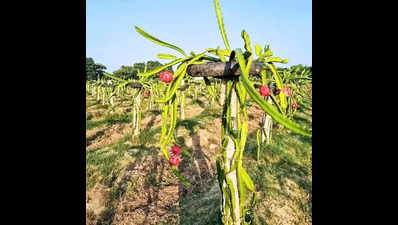Bhagalpur Emerges as a New Center for Dragon Fruit Farming | Patna News – Times of India


Bhagalpur: Thanks to experiment by the Krishi Vigyan Kendra (KVK) of the Bihar Agricultural University (BAU), Bhagalpur, the exotic pink-coloured cactus species fruit ‘pitaya’, commonly known as ‘dragon fruit’, will soon be commercially grown by farmers of Bhagalpur region.
The fruit is widely grown in southern Mexico, USA, Australia, Guatemala, Costa Rica, El Salvador, China, Japan, Taiwan, Thailand and other foreign countries.
BAU vice-chancellor D R Singh said on an experimental basis the exotic fruit is being grown on a piece of land in KVK inside the BAU headquarters, and by next year the plants would start bearing fruits. He said the BAU will soon provide sowing plants to the farmers of Bhagalpur region for cultivation of the dragon fruits. “Research and experiments by the scientists and researchers at the BAU have been successful, and the farming activities for commercial production by the farmers will be a reality by next year,” he claimed.
He said farming of the dragon fruits will be very useful in the backdrop of climatic changes, as the plant needs less water for irrigation. The VC said training to the farmers for growing the exotic fruit would be provided by the BAU.
In-charge of KVK, Rajesh Kumar, and A K Singh, director (research) at BAU, said the dragon fruits’ experimental farm in BAU campus is attached with RCC poles for the safe growth of the creeping plants. “The dragon fruit plants are not harmed by the grazing animals as the plants have thorns in their stems,” they said, adding that the plant grows like creepers.
Detailing the advantages of the exotic fruit plant, they said the plant does not get infected with diseases and therefore the farmers will be free from the troubles for its protection. They said the fruit fetches good prices and are sold at the rates between Rs150 to 200 per kg and have a long shelf life, giving advantage of its long storage and seamless transportation to faraway markets. They said each fruit has a weight of 300 to 800 grams and the average yield is between 5 to 6 tonnes per acre of land.
Scientist and assistant professor at BAU, Md Shamim, said the plants can survive for nearly 25 years with the fruit occurring around five times in a season between May to October each year.
In India, the dragon fruit is cultivated in only a few states, including Maharashtra, Karnataka, Andhra Pradesh etc. It has caught the attention of people across the nation because it is rich in vitamins, minerals and antioxidants. Shamim said saying the eastern part of the state is likely to become farming hub of the fruit soon.















